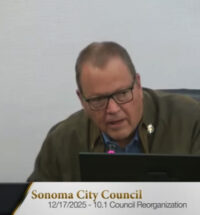Along with the promise of huge tax revenues, legal weed promises to bring unprecedented economic and social changes. Are we ready?
— By Jonah Raskin | Special to The Sun
Lynette Shaw owns and operates the only licensed medical marijuana dispensary in Marin County, California, home to both San Quentin Prison and George Lucas’s Skywalker Ranch. She also provides the most widely recognizable face of marijuana in Marin. Over the past two decades, dispensaries like hers have served as outposts of the grey-market economy in weed.
Shaw’s dispensary, Marin Alliance, is conveniently close to the 101, an eight-lane freeway that cuts right through the county and provides the easiest way for traffickers to move tons of marijuana south and cash north. The marijuana comes down from the “Emerald Triangle”—one of the primary marijuana-growing regions in the world—once known as the “Redwood Empire” because of the giant trees that were logged, milled, and then shipped to the port of San Francisco. Marijuana is the number-one cash crop in California, with an estimated value of $10-12 billion and soaring monthly. It’s bigger than lettuce, almonds, and grapes.
This month the industry takes a big step out of the shadows. In 2016, California voters approved a measure, Prop 64, that allows for the recreational use of marijuana by adults. The move, which will make California the seventh state to legalize weed, promises to bring unprecedented economic and social changes to an industry that has grown increasingly corporate, with large-scale operations commanding the market. It means that, from 2018 on, smoking a joint or eating a weed-laced brownie will become almost as legal as drinking a beer, if you’re 21 or over. But “almost” is a key word. Prop 64 does not repeal the prohibition against marijuana. Citizens who grow, transport, and sell pot without state licenses and county permits will be subject to harsh civil penalties and forfeiture of property. Teenagers are not the only ones who don’t like the new regime.
Legalization brings regulation. Indeed, no crop in California, or in the nation, will be more intensely monitored and controlled than California marijuana, in part because it has been unregulated in the past and because lawmakers want to compensate for previous lapses. Moreover, there’s still an underlying fear of marijuana, which is perhaps most pronounced among politicians who feel they have to protect, with legislation, the public, especially the young and old, against what they perceive as a dangerous substance—the “gateway” drug that they insist leads inevitably to methamphetamine and heroin.
Over the past two decades, the industry to which Shaw belongs has slowly come up from underground in part because growers tired of their illegal status—without fully understanding what legalization would mean. Still, the major impetus for regulation and taxation has come from the state of California itself, as well as some pot consumers and their elected officials, who have regarded marijuana with a mix of fear and longing. Like Colorado, Washington and Oregon, which have both legalized marijuana, California means to extract as much money as possible from growers, dispensary owners and dealers through taxes and fees.
The brave new world of legal marijuana might not work. The outlaws who have kept the weed business going until now don’t like or want to follow rules. And lawmakers don’t know much about marijuana, which isn’t cultivated or processed like grapes and walnuts and doesn’t behave like a glass of Pinot Noir or Chardonnay. (Marijuana is cultivated year round, indoors as well as outdoors, and, unlike grapes it cannot be dry farmed. It must have water and light—either from the sun or an artificial source, which means that electricity bills can be astronomical and the environmental harm significant as well.)
For decades, Sacramento lawmakers have not thought of marijuana as a business, but rather as a criminal activity. Growers, for their part, have all too often viewed it as a kind of magical cottage industry that exists outside the world of business and economics—brushing aside the fact that their enterprise demands loans, labor, markets, consumers, mass production, public relations, advertising, and sometimes a pistol, a rifle, or an automatic weapon to seal a deal.
As governor, Arnold Schwarzenegger helped the process of decriminalizing and legalizing weed. Before he left office in 2010, he approved legislation that downgraded possession of an ounce or less from a misdemeanor to an infraction, punishable by a $100 fine. With that stroke of the pen, he undermined some of the impetus for full legalization led by the National Organization for the Normalization of Marijuana (NORML). Then, under Governor Jerry Brown, California created the model of the medical marijuana dispensary as a non-profit operated by “collectives.” People who were arrested could use a medical defense and avoid prison. With Prop 64 and the adult use of marijuana, the medical defense will no longer be available to defendants. That’s a big loss, criminal defense lawyers say.
Under the old system, “caretakers” were supposed to work as Good Samaritans for sick patients. Many growers and “providers” gamed the system. They created bogus patients and fake recommendations and used both as covers to cultivate large-scale commercial crops. Members of the collectives became wage-earning employees, and their bosses got rich. From the Bay Area, marijuana was exported clandestinely to LA, Chicago, New York, Atlanta, and New Orleans, where it sold for at least twice the California price.
In 2016, Governor Brown appointed Lori Ajax the chief or “czar” of the California Bureau of Cannabis Control (BCC). She and her agency have been charged with taming an out-of-control industry and eliminating the “bad guys.” Not surprisingly, growers and dealers who have never paid taxes or adhered to state mandated guidelines are balking at plans to regulate and tax their industry. They’re threatening to return to the underground economy.
State politicians are already exaggerating the revenues that will accrue to Sacramento. Pot dollars, they hope, will rescue under-funded agencies and programs. State Senator Mike McGuire, who represents both Marin County and the Emerald Triangle, sounds like an exuberant front man for weed. “The North Coast already has the best cannabis on the planet,” he boasts. He also sounds like as a cautious legislator. At a recent “Wine and Weed” symposium, McGuire told a standing-room-only crowd of wine makers and pot farmers that it would take years to bring the illegal, underground pot industry into the light of day and normalize it.
It may take longer to change the thinking and behavior of the police. After all, cops in California have been arresting people for violation of the marijuana laws since at least the Summer of Love in 1967. They have seen themselves as heroes who have fought “evil” and provided a bulwark as crime and criminals. Yet attitudes are changing even in police departments as younger officers replace older ones. Cops will still have plenty to do: arresting anyone under the age of 21 who smokes marijuana, or confiscating the cargo in a truck driven by a distributor who doesn’t have a state-issued license or transports more than the license allows. The California Highway Patrol wants to be tasked with enforcing the new laws and also to be able to test drivers to determine if they’re operating a vehicle under the influence.
If you want to get into the industry, it’s probably too late unless you have $5 million you can throw around to buy California real estate, which is already overpriced. Mexican farmworkers who once harvested tomatoes for $10 an hour are now making $25 an hour in the marijuana fields because it’s more highly skilled labor that requires sophisticated techniques and because of the risks of a police raid. As of January 2018, old risks will diminish, while new ones will take their place. Marijuana growers who don’t follow the new rules pertaining to soil, water, financial records, wages, and safety will be subject to penalties. They won’t serve jail sentences, but they could forfeit their property and be rendered paupers. Undocumented farmworkers will be arrested and subject to deportation no matter where they work in agriculture, and the seasonal laborers who come from Argentina, Sweden, and France to the work the harvest will be arrested if they don’t have visas or if they carry large amounts of cash.
Beginning in the 1960s and then for the next several decades, Lynette Shaw was just one of millions of Californians who got caught up in the culture and business of smoking and selling weed. But she made it her life’s work and her mission. Cannabis provided a way for Shaw to maintain her counterculture identity while also making connections with movie stars. “I was Hollywood’s weed girl,” she once boasted. In 1982 Shaw was briefly a suspect in the death of comedian John Belushi, who had injected cocaine and heroin. (A police investigation determined that she had played no role in the incident.)
In 1996, she and Dennis Peron, a Vietnam veteran and gay-rights activist, were among the leading advocates for Prop 215, the Compassionate Use Act, which ushered in the era of medical marijuana. They went door to door, gathering thousands of signatures, many from liberal Democrats as well as libertarians. Two Fairfax mayors and the District Attorney of Marin County supported them. Before long, Marin Alliance had more medical marijuana members—9,000—than there were citizens in the town of Fairfax.
But during the Obama administration, Shaw was increasingly a target of the Justice Department.
In 2011, after a long battle, the federal government finally forced Shaw to close her shop. In the spring of 2017, with help from friends and investors, Shaw reopened. Surprisingly, Donald Trump’s election helped make it possible. The new administration had bigger targets in its sights, such as refugees and undocumented immigrants, although Attorney General Jeff Sessions still insists that states cannot override the federal ban on sales of marijuana. “I want to thank Donald Trump,” Shaw says facetiously. “After he moved into the White House he fired a bunch of lawyers who were working on my case. They cleared out their desks and left Washington, D.C.”

Loyal customers came back for the grand opening. Dozens of customers—young and old, black and white, men and women, ill, infirm and some seemingly healthy—bought ounces of marijuana with names like “Zombie” and “Blue Dream.” A man named Dan described himself as a former marijuana smuggler who had served time in prison. “This place has been good for the community,” he said. “What’s happening here is just the beginning of something bigger and maybe even better.”
Like her customers, Shaw was understandably elated, though she appeared to be more guarded and more cautious than she had ever been before, lest she lose her dispensary once again. Indeed, her future might not be as bright as she’d like. Officials could rescind her permit. Liberal and wealthy Marin usually votes for marijuana measures when they’re on the ballot. But when pot entrepreneurs try to open dispensaries, pot foes attend meetings of the Board of Supervisors and voice their opposition. “Not in my backyard” is as popular a sentiment in Marin as it is in many other well-to-do communities. Shaw has the only permit for a dispensary not because officials want her to have a monopoly, but because they argue that marijuana tends to attract “undesirable elements.” In their view, one is enough.
The impulse of dispensary owners, pot distributors, and pot farmers to stay under the radar has made it difficult to organize them into a union or a pot chamber of commerce. As Alexander Carpenter—a cannabis activist and botanist—knows only too well, marijuana folk are “apolitical, atomized, and largely scared.”
Young, mostly white farmers who raise other crops have recently formed The Farmers Guild, which has chapters all over Northern California. But the Guild is cautious about marijuana and has not taken a stand for or against legalization. Unlike Guild members, cannabis growers rarely leave their homes and their lands, unless it’s to deliver weed, attend by-invitation-only harvest parties, or travel to tropical islands after crops have been sold. However, two new organizations, the California Growers Association and the Sonoma County Growers Alliance, have recently taken shape and have attracted a few hundred members, a tiny number in an industry with hundreds of thousands of farmers, farm workers, and seasonable employees. As factories in the field replace the cottage industry, the marijuana work force may come to resemble the workforce in agribusiness. Perhaps then a strong union might be possible.
Meanwhile, after half a century, the war on marijuana, as part of the larger war on drugs, has left scars on California society. It has set neighbors against neighbors, encouraged the use of police informants and snitches, and created a large body of ex-felons who have served time in prison for possession of small amounts of weed. According to the ACLU, 8.2 million Americans were arrested for marijuana offenses between 2001 and 2010.
Moreover, despite roughly equal rates of use, African Americans are almost four times more likely than whites to be arrested for marijuana.
In the brave new world of legal marijuana, the black marketers still won’t pay taxes. That will mean that their costs will be lower and presumably their profits higher than those who have to pay for permits and bring their operations in alignment with the rules. As one long-time woman grower—who also owns a food store—said, “I have been risking an arrest for twenty-five years and haven’t been arrested yet. I plan to go on risking an arrest.” She added, “They can’t arrest all of us and take all of us to jail. That would clog the whole criminal justice system and then we’d be back to where we were under the old-style prohibition.”
The urban cannabis customer has to a large extent triumphed over the cannabis grower, though under the new laws, individuals will be able to have six plants provided that the crop is for their own personal use and not for sale on the market. Of course, they can also give it away without incurring penalties.
It has taken decades for California to get into the cannabis mess, and it will take years for its residents to clean it up. Almost every farmer and entrepreneur in the industry today is in a state of high anxiety, as they move into the future, make investments in land, greenhouses, and infrastructure, and get ready to open stores that will sell ounces and grams to consumers who like to get stoned. Meanwhile, attorneys who once specialized in criminal defense law and who are fast becoming experts in business law prepare to go to court to defend a whole new crop of cannabis clients.
Jonah Raskin is the author of “Marijuanaland: Dispatches from an American War” that is published in English and in French. This piece first appeared in Dissent magazine.










Be First to Comment